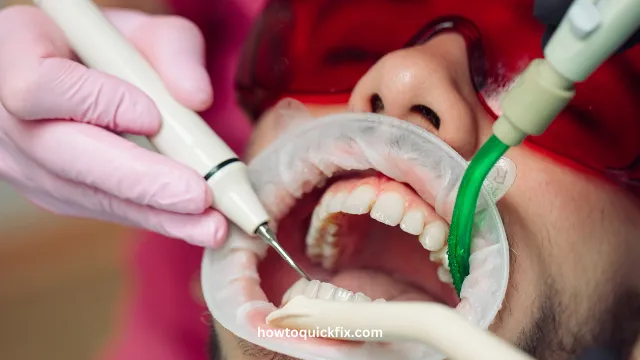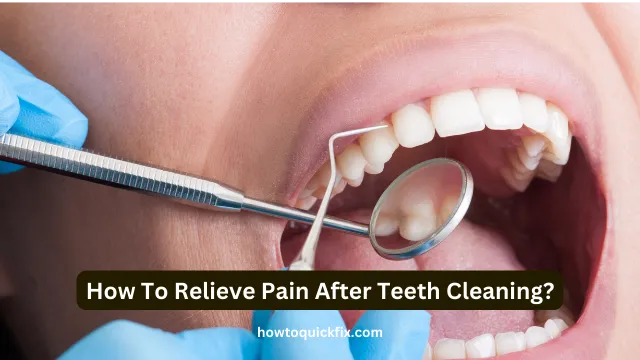A teeth cleaning appointment is essential for maintaining healthy gums and a bright smile. But for many, the aftermath can be surprisingly uncomfortable, leaving you wondering how to deal with the lingering pain or sensitivity. If you’ve ever found yourself dreading meals or avoiding cold drinks after a cleaning, you’re not alone.
This discomfort is often temporary, but it can feel like an eternity when you’re dealing with sensitive teeth or sore gums. Whether it’s the sharp sting of cold air or the ache from your dentist’s tools, understanding how to manage this pain is crucial for a happier, healthier mouth.
In this guide, we’ll explore effective, natural remedies and practical tips to relieve discomfort after teeth cleaning. From home solutions to dietary adjustments, you’ll learn how to protect your smile without suffering through unnecessary pain. Let’s help you bounce back to comfort, so you can enjoy the benefits of professional cleaning without the drawbacks!

Contents
1. Understanding Post-Cleaning Sensitivity
Teeth cleaning can sometimes lead to temporary pain or sensitivity due to plaque removal and gum irritation.
The dentist’s tools can expose sensitive areas of the tooth, causing discomfort. This is especially common if there’s existing gum inflammation.
Understanding that this pain is normal and temporary helps reduce anxiety, allowing you to focus on effective solutions.
2. Immediate Remedies for Pain Relief
After your cleaning, try using over-the-counter pain relievers like ibuprofen to ease any inflammation or soreness.
Rinsing with warm salt water can soothe irritated gums and reduce swelling. This simple remedy works wonders for post-dental discomfort.
Consider switching to a desensitizing toothpaste, which can provide quick relief and protect your teeth from further sensitivity.
3. Long-Term Oral Care Adjustments
Maintaining a consistent oral hygiene routine is key to preventing pain during future cleanings.
Brush gently with a soft-bristled toothbrush, as hard brushing can aggravate sensitive areas. Flossing daily also helps maintain gum health, reducing the risk of inflammation.
Regular use of fluoride rinses or treatments strengthens enamel and minimizes sensitivity over time, making your teeth less reactive after cleanings.
4. Foods to Eat (and Avoid) Post-Cleaning
Soft foods like mashed potatoes, yogurt, or soup are ideal for sensitive teeth after a cleaning session.
Avoid acidic or spicy foods, which can irritate freshly cleaned teeth and gums. Be cautious with hot or cold beverages, as temperature extremes may worsen discomfort.
Eating nutrient-rich foods supports overall dental health, helping your mouth recover faster from cleaning-related pain.
5. When to Seek Professional Advice
If your pain persists beyond a few days, it’s important to consult your dentist. Prolonged discomfort could indicate underlying dental issues.
Pain lasting more than a week might be a sign of gum disease, cavities, or overly aggressive cleaning techniques. Addressing these problems early can prevent long-term complications.
Your dentist may recommend additional treatments like fluoride varnishes or specialized care routines to alleviate sensitivity.
Conclusion
Experiencing pain after a teeth cleaning appointment can be frustrating, but it’s a manageable and temporary side effect of maintaining a healthy smile. By incorporating gentle oral care practices, using effective home remedies, and making smart dietary choices, you can quickly relieve discomfort and protect your teeth in the long run.
Remember, a little sensitivity today means healthier teeth tomorrow. Stay proactive about your oral hygiene routine, and don’t hesitate to seek professional guidance if pain persists. The relief you need is within reach, and your smile will thank you for the extra care.
FAQs
Why do my teeth hurt after cleaning?
Teeth hurt after cleaning due to gum irritation, plaque removal, or exposed tooth areas, which can cause sensitivity.
How long does post-cleaning sensitivity last?
Typically, sensitivity lasts for one to three days, but it can extend longer if underlying dental issues exist.
What can I use to relieve discomfort at home?
Use desensitizing toothpaste, warm saltwater rinses, and over-the-counter pain relievers to reduce discomfort.
Are soft foods better after cleaning?
Yes, soft foods like yogurt or soup are gentle on sensitive teeth and reduce the risk of additional irritation.
Should I brush my teeth after cleaning if they hurt?
Yes, but use a soft-bristled toothbrush and gentle strokes to avoid aggravating soreness.
When should I contact my dentist about the pain?
If pain lasts beyond a week or worsens, consult your dentist to rule out underlying issues like gum disease.








